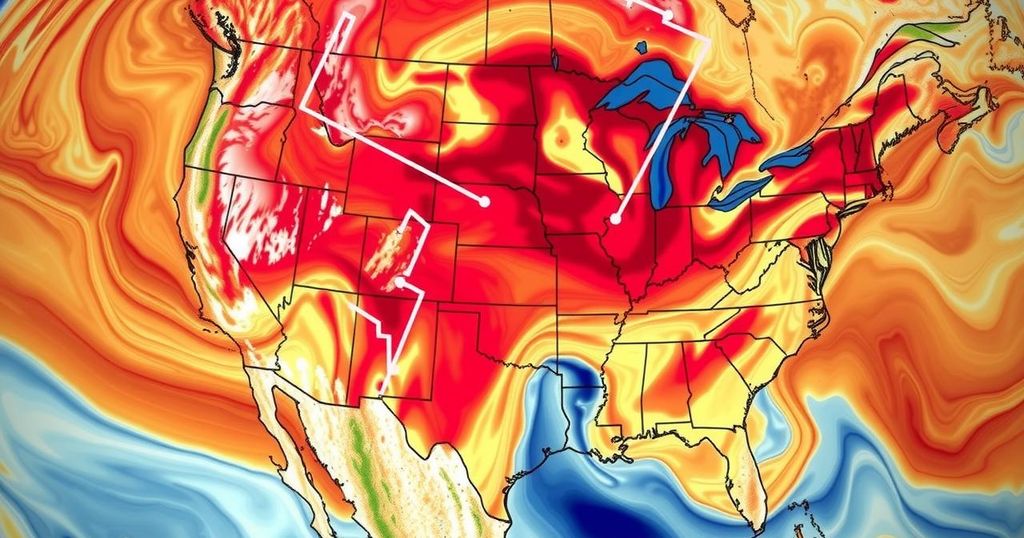The World Meteorological Organisation (WMO) announced that 2024 is likely to be the warmest year recorded, with greenhouse gas emissions at unprecedented levels. The Secretary-General emphasized the critical effects of minor temperature increases on extreme weather events. Climate change has significantly intensified numerous weather-related disasters this year, necessitating a coordinated international response to mitigate risks associated with extreme heat.
The year 2024 is projected to be the hottest on record, culminating in a decade marked by unprecedented heat driven by human activities, as reported by the World Meteorological Organisation (WMO). In a release issued on December 30, 2024, the WMO indicated that greenhouse gas concentrations are at historical highs, resulting in continued warming. The official global temperature figures for 2024 are to be disclosed in January, with a comprehensive report on the state of the global climate set for March 2025.
WMO Secretary-General Celeste Saulo emphasized the significance of even the smallest increments in temperature, noting that they exacerbate climate extremes and associated risks. “Every fraction of a degree of warming matters, and increases climate extremes, impacts and risks,” she remarked. The year witnessed several catastrophic weather events, including record rainfall, floods, and hurricanes leading to significant loss of life and severe humanitarian crises across various continents. Particularly devastating tropical cyclones have inflicted both human and economic tolls, as exemplified by the recent impacts in Mayotte, an overseas department of France in the Indian Ocean.
This year also experienced extreme heat, with temperatures soaring above 50 °C in many locations, while wildfires caused extensive damage. The extreme weather occurrences highlight the urgent need for the WMO’s initiative, “Early Warnings for All,” which aims to enhance climate service delivery and development to facilitate adaptation efforts. Concurrently, the WMO has initiated the Global Greenhouse Gas Watch initiative as part of its climate mitigation strategy, actively supporting the work of the United Nations Framework Convention on Climate Change and COP meetings.
For 2025, WMO has committed to focusing on the cryosphere—covering Earth’s frozen regions—given the International Year of Glaciers’ Preservation, in collaboration with UNESCO and various partners. A recent report from World Weather Attribution and Climate Central revealed that climate change significantly intensified 26 out of 29 studied extreme weather events, resulting in over 3,700 fatalities and displacing millions. The report also indicated that climate change contributed an additional 41 days of hazardous heat in 2024, adversely affecting human health and ecosystems.
As global temperatures continue to increase, the incidence of extreme heat events is expected to rise, necessitating enhanced international cooperation to mitigate associated risks. Recently, a coalition of experts from 15 international organizations, 12 nations, and several academic and NGO representatives convened at the WMO headquarters to develop a coordinated approach to combat the escalating threat of extreme heat, responding to the UN Secretary-General’s Call to Action on this critical issue.
The World Meteorological Organisation (WMO) has been monitoring climate changes and their impacts globally, highlighting the growing threat posed by climate change. The consistent rise in greenhouse gas emissions has contributed significantly to global warming and subsequently has led to an increase in extreme weather events. Understanding the implications of these changes is crucial for effective climate adaptation and mitigation strategies.
In summary, 2024 is on track to become the hottest year recorded, driven by human activities that elevate greenhouse gas emissions. The WMO’s insights underscore the urgent need for global initiatives to address the escalating impacts of climate change, particularly in relation to extreme weather phenomena. As events become increasingly severe, collaborative frameworks and strategies must be established to safeguard communities and ecosystems.
Original Source: www.wam.ae






